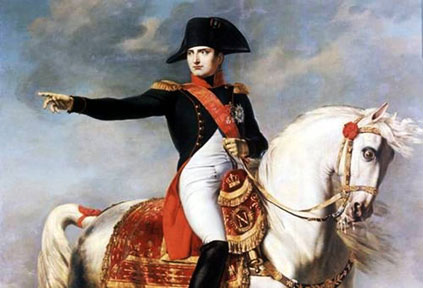Napoleon Bonarparte meets his Waterloo
By Premasara Epasinghe
When an individual faces a humiliating defeat against an opponent, we
often say “He met his Waterloo.” It is an English idiom.
What is an idiom? It is a phrase or sentence whose meaning is not
clear from the meaning of its individual words and which must be learnt
as a whole unit. The English language has many idioms.
|

Napoleon Bonarparte |
The Battle of Waterloo was the key event in the 19th century European
history. It took place on June 18, 1815. It was the final engagement of
the Napoleonic war, fought about 12 miles from Brussels, Belgium.
Wellington
The Duke of Wellington (1769-1852) British General and politician,
Prime Minister (1828-1830) was the hero, who defeated Napoleon
Bonarparte. He commanded the allied force in the Peninsular War
(1808-1814), against Napoleon Bonarparte, driving the French back over
Pyrenees. He represented British at the Congress of Vienna (1814-1815).
Together with the Prussian General Von Blucher, he defeated Napoleon
Bonarparte at the Battle of Waterloo in 1815. He became a Tory Cabinet
Minister in 1818 and the Prime Minister in the same year.
Who was Napoleon Bonarparte?
Invasion of Egypt
He was born in 1769 and died in 1821. Undoubtedly, he was one of the
greatest military leaders of the modern times. In 1798, he launched an
invasion of Egypt, but was defeated by Nelson, at the Battle of Abukir
Bay. In 1799, he returned to Paris, where his group of 18 Brumaire
(November 9) set up the consultate. In 1800, he defeated Marengo, made
peace with Britain at Amiens (1802).
In 1812, he invaded Russia, with an army of a million, but perished
in the “Russian Winter.” In March 1815, he returned to France,
overthrowing Bourbon.
King Louis XVIII
The 100 days of his return to power ended with the defeat of the
Battle of Waterloo – (June 1815). Napoleon Bonarparte was exiled to St.
Helena, where he died.
The allies massed their forces for a final showdown with the French
Emperor. A British force of 68,000 under Duke of Wellington encamped in
Belgium, as did a strong army of 89,000 led by Field Marshal Blucher.
About 165,000 Napoleon troops marched to Belgium. The French
succeeded in Defeating Prussians at Ligny on June 16, 1815. Then, they
turned to deal with the British at Waterloo, a few miles South of
Brussels on June 18. Napoleon, might have defeated Wellington, but for
timely arrival of Blucher during the battle.
Authentic information
An eye-witness of history relating to the Battle of Waterloo reveals
authentic information. Captain J.H. Gronow, was a British officer. He
and his brother officers said that they saw Napoleon Bonarparte on his
white horse in the battlefield. At about 4 p.m. French Artillery fired.
Army marched forward. The army glittered like a stormy ware of sea. They
were firing all over. There were even oldsoldiers marching.
From all angles Duke of Wellington, entered the square, accompanied
by one-aide. All the rest of his staff was not there. Duke of Wellington
appeared perfectly composed. He looked pale, but very thoughtful. He was
a great war strategist and a brilliant tactician in the battlefield. The
French Cavalry was bravely and gallantly executed. The officers were
exceedingly fearless. They renewed the attack. Fierce fighting was going
on.
The Duke of Wellington, sat unmoved thinking. He asked his Lt.
Colonel Stanhope, for the time. Colonel Stanhope said, it was 40 minutes
to 5 p.m. The Duke said if the Prussians arrived, it would be the end of
the war. According to Captain Gronow, British officer, Duke of
Wellington, suddenly gave orders to retire. Enemy's artillery were in a
close distance, about 100 yards.He believed that attack was the best
form of defence. The British army was lying down. Emperor Napoleon
Bonarparte led in front. There were about 20,000 soldiers. All of a
sudden Duke of Wellington ordered: “Get up guard, attack, attack,
attack.” The British Army fired a volley and rushed like panthers and
attacked the French line. Later, there were heaps of dead bodies.
After the final defeat at the Battle of Waterloo in June 1815,
European powers would take no further chances with him. They exiled
Napoleon Bonarparte, to an isolated island St. Helena in the South
Atlantic ocean. Thus, ended the life of Napoleon Bonarparte. His defeat
at the Battle of Waterloo meant he had to abdicate. |

